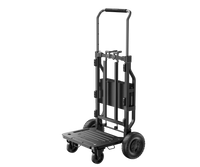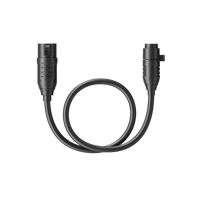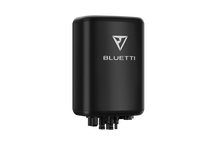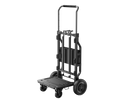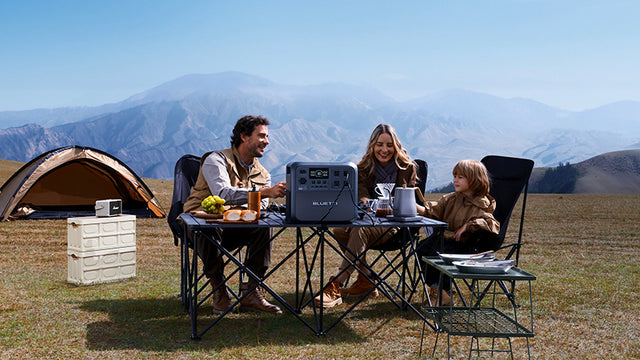Your cart is empty
Shop our productsCamping offers a wonderful escape from the hustle and bustle of daily life and allows you to enjoy nature. It is also an excellent way to learn more about the principles of sustainability and conservation. One way to enhance your camping experience is to use portable solar panels. These lightweight and compact solar panels are particularly well-suited for car camping or backpacking, where minimizing weight is crucial.
In this article, we take a closer look at what portable solar panels are and how you can use them to enhance your camping experience.
What are Portable Solar Panels, and How Do They Work?
Portable solar panels are compact and lightweight photovoltaic (PV) panels designed for ease of transportation and use.
They work by harnessing the energy of the sun through photovoltaic cells. These cells are made of semiconductor materials, typically silicon, and are arranged in a panel. When sunlight hits the cells, it excites the electrons in the material, causing them to flow and create a direct current (DC) electrical charge.
The DC charge passes through a charge controller, which regulates the charge and ensures that the battery or other power storage device is not overcharged. The DC power is then either used directly to power devices or is converted into alternating current (AC) power through an inverter for use with AC devices.
Portable solar panels can generate power as long as sunlight is available. They are easy to transport and set up, making them ideal for outdoor activities, camping, and off-grid living.
How Can Solar Camping Enhance Your Camping Experience
There are many reasons why campers prefer using portable solar panels instead of gas-powered generators or campground hookups. Solar technology isn't only more eco-friendly but allows you to boondock off the grid away from crowded camping spots. Here are some in which portable solar power can enhance your camping experience.
1. Eco-Friendly
Portable solar panels are an eco-friendly source of energy that does not produce harmful emissions or require fossil fuels. Thus, they are an excellent way to reduce your carbon footprint and protect the environment. Additionally, using solar power can help reduce dependence on non-renewable energy sources, such as coal, oil, and gas.
2. Cost-Effective
In the long run, portable solar panels can be a cost-effective alternative to traditional power sources, such as generators or fuel. While the initial cost of purchasing solar panels may be higher, they have a longer lifespan and require minimal maintenance, which can help save money over time. Furthermore, using solar power can help reduce fuel costs associated with transporting fuel to remote camping locations.
3. Lightweight and Portable
Portable solar panels are designed to be lightweight and compact, making them easy to carry and transport. This is especially important for camping and hiking trips, where every ounce of weight matters. Some solar panels are so small and lightweight that they can be attached to a backpack and charged while on the move.
4. Versatile
Portable solar panels can be used to charge a wide range of devices, including smartphones, tablets, cameras, laptops, lights, and small appliances. You can use it to power a camping stove, a fan, or a water pump and enjoy a comfortable and convenient camping experience.
5. Convenient
You can set up portable solar panels quickly and easily without any need for complex wiring or installation. Most solar panels come with pre-installed connectors so you can plug and play, providing instant power when you need it.
6. Quiet and Low Maintenance
Portable solar panels don't produce any noise or fumes, making them ideal for camping in peaceful natural environments. They also require very little maintenance, as they don't have any moving parts and can withstand harsh weather conditions.
How to Use Solar Panels for Camping?
Using a portable solar power system for camping always starts with your requirements. Here are the steps you need to take to make the right choice.
1. Understand Your Power Requirements
The first thing you need to do is to estimate your energy usage. This involves considering all the appliances or devices that you plan to use during your trip. Once you have an idea of your energy requirements, you can perform some simple calculations to estimate your energy consumption in kilowatt-hours.
For example, if you plan to take lights with you on your trip, you will need to calculate how much energy your lights will consume each day. To do this, multiply the combined watts of your lighting system by the number of hours you expect to use it. Finally, divide the total by 1000 using the following formula:
kWh = (watts x hours) / 1000
It is important to understand that one kilowatt equals 1000 watts of power, and one kilowatt-hour equals 1000 watts of energy for one hour.
In addition, it is crucial to consider surge watts, which refers to the amount of electricity required to get your appliance up and running. Many appliances require additional power for a few seconds when first turned on. To estimate the additional surge watts required, you can use the following formula:
Watts = Volts x Amps
The surge watts are usually estimated to be 1-2 times the running wattage, which can often be found on the device itself.
2. Choose the Right Site
It's important that you choose the right camping spot to have an enjoyable and successful camping trip. In addition, you need to pick the right place for your solar panels.
You essentially have two options. If you're going camping in a motorhome or RV, you could place flexible and rigid solar panels onto your vehicle. However, you can opt for a portable power station if you're camping on foot or don't have a camping vehicle.
When you use portable solar panels for camping, you can easily position them to ensure you receive the highest amount of sunlight. In fact, you even change the angle as the position of the sun changes.
3. Pick Your Components
There are some essential components you will need when using portable solar power for camping.
- Solar battery
- Solar panels
- Solar regulator, also known as a charge controller
- Inverter
At Bluetti, we have several different solar generators that have all the above-mentioned components in a single plug-and-play device. You just have to position your solar panels correctly, and you are good to go!

How to Get the Most Benefit from Portable Solar Panels?
Here are some ways in which you get the maximum benefit from portable solar panels. With these tips, you can enjoy your camping trip to the fullest without worrying about running out of energy.
1. Invest in High-Efficiency Panels
Solar panels consist of photovoltaic cells that convert sunlight into electricity. However, not all the solar energy that hits the panel can be transformed into usable electricity. This is why you need to pay attention to the panel's efficiency, which is essentially the percentage of energy that the photovoltaic cells convert into electricity.
In recent years, solar cell technology has made significant advancements, increasing average solar cell efficiency from 15% to 20%. Nonetheless, the efficiency and cost of a solar panel are determined by its material and structure, meaning that not all panels are created equal.
If you want to get the best results, investing in a more efficient model of commercial solar panel, despite its higher initial cost, may be the most crucial decision you can make.
2. Install the Solar Panels Correctly
The amount of energy you can generate from your solar panels is largely impacted by their orientation. It is advisable to identify the direction that provides the most favorable results for your location and install your panels accordingly. While a compass is the best way to figure this out, you can do it in some other ways as well.
When positioning your solar panels, ensure they face southward or eastward, as these are the optimal directions for capturing solar energy. Additionally, if you have enough space, you can place multiple panels together to enhance energy efficiency. It's crucial to note that when positioning multiple panels together, they should face southward or eastward and not westward, as this can improve their efficiency.
3. Keep Your Solar Panels Clean
To maximize the effectiveness of your portable solar panels, you need to keep them free from dirt and dust. When panels accumulate grime, they cannot capture light efficiently. This causes them to work harder to produce the same amount of energy. Debris on the panels can also block sunlight, resulting in reduced electricity production compared to a clean panel.
It's inevitable for dirt and grime to build up on portable solar panels. Although they are not robust enough for use in harsh environments, they can withstand some wear and tear during their lifetime. However, if you use them in dusty or dirty locations, like an open field, you may need to clean them regularly to maintain peak efficiency.
The recommended cleaning method for removing buildup is using water and soap. You can apply any mild detergent to eliminate dirt and grime from the panels. However, avoid using harsh chemicals as they can harm the panels over time.
Additionally, you might want to use a high-pressure hose to clean the panels, but this can damage the solar cells. Instead, use a soft brush or rag and a bucket of water to clean them effectively without damaging the panels.

Wrapping Up
If you love to go camping and want to do so without harming the environment, portable solar panels are the best way to go! These panels are an eco-friendly source of energy and do not harm the planet.
If you're looking for the best portable solar panels for camping, make sure to check out our products at Bluetti. Our panels have an efficiency of up to 23.4% and can help you power all your camping gear.
Shop products from this article
You May Also Like

What Does a 30% Federal Solar Tax Credit Mean and How to Apply?
Governments around the world are offering programs that encourage homeowners to switch to solar energy. Among the most notable programs is the 30% Federal Solar Tax Credit. It reduces your...

Deadly Flooding Devastates U.S. South and Midwest — What You Need to Know





































































